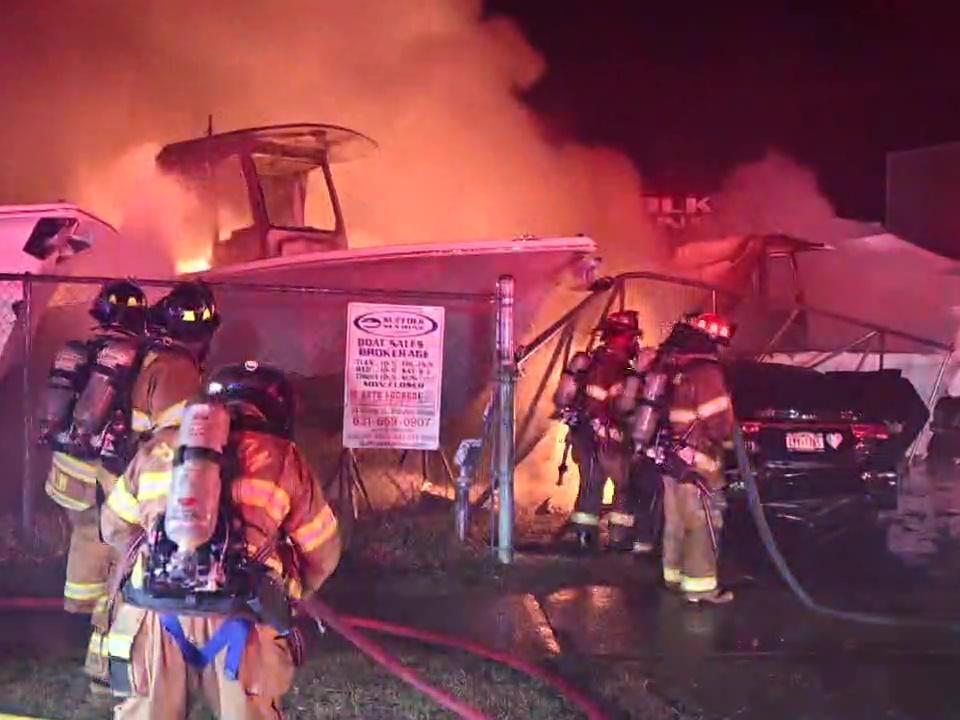Well, it seems that it's good enough for California, it's good enough for other mindless states including NY, NJ, MA, OR & WA! Talk about the blind leading the blind...
Breaking News! Motorhome Sales Banned in Six States
The RV Industry is reeling this week as California and five other clean air states are about to ban the sale of motorhomes with a gross vehicle weight (GVWR) of over 8,500 pounds.
This includes most motorhomes.
- The average weight range for a Class C RV is 10,000–12,000 lbs.
- The range for a Super C Motorhome is 19,500 lbs and up
- The average GVWR of a Class A motorhome typically ranges from 13,000 to 30,000 lbs
Class B motorhomes – campervans – typically weigh 6,000- 8,000 pounds GVWR and thus won't be affected.
This ban affecting the larger motorhomes will be effective Jan 1, 2025, and it’s a story that has caught everyone by surprise. It came to widespread attention just a few days ago when a letter sent by Newmar RV to its dealers in the affected states came to light, telling them of the coming sales ban.
Now the reason this has shocked the industry is because, frankly, the industry really expected an exemption from a program that seems aimed at big diesel trucks that are driven around the clock, not low mileage recreation vehicles that typically drive 3,000-5,000 miles a year.
Their reasoning is sound. It seems pretty cut and dry. But several industry leaders I talked to in preparing this special report felt much more should have been done and that perhaps there was a complacency and lack of urgency in dealing with this.
The Advanced Clean Truck Regulation
California and the five other states that have signed on to the same clean air regulations haven’t made a secret of this at all.
The Advanced Clean Truck Regulation has been out there for over a year now. The other states that have adopted it are Oregon, Washington, Massachusetts, New York, and New Jersey.
You may wonder why California is the driving force here.
Because under
Section 177 the federal Clean Air Act that regulates air emissions, California is the only state authorized to set vehicle emission standards and other states wanting to adopt their own such regulations can do so only if they are identical to California's.
But no one in the industry really thought RVs would be affected by the Advanced Clean Truck Regulation. They thought RVs would be treated differently than big commercial trucks once regulators understood the problem making big motorhomes all EV.
But that understanding didn’t happen, and as of right now, California and the five other states following that ACT regulation have not exempted RVs and, in fact, will halt the sales of most motorhomes manufactured after January 1, 2025.
Why? Because of clean air regulations, internal combustion vehicle manufacturers are required to have a certain percentage of EVs – 11% in 2025. The bigger the percentage, the more “credits” the regulation gives them to allow sales.
That’s years away for most motorhomes.
Winnebago, Thor, and others have tinkered around with EV Class B campervans, but none are near ready for the marketplace.
The technology for bigger Class As and Super Cs just isn't anywhere near ready for that to happen because the weight of the batteries required to power a big motorhome would make them so heavy they could barely move, and the frames, tires, and components currently available just could not handle it.
This is very complicated and bureaucratic, and it is led by California and The California Air Resources Board (CARB), which has been on a relentless quest to force internal combustion engine manufacturers to go EV by requiring them to have ever-increasing percentages of their fleet be all-electric.
The car manufacturers have been largely complying, but the rule that is now causing all the controversy is the Advanced Clean Truck regulation and how it affects recreational motorhomes.
The new Advanced Clean Truck Regulation followed by California and five other states, as of January 1, 2025, bans all new vehicles over 8,500 pounds unless their manufacturers also make a certain percentage of zero-emission Electric Vehicles. RV motorhomes are not excluded.
So here’s the catch: As we said, the bigger motorhomes have no EVs. And they won’t. At least not for a long time.
For Class C motorhomes, the situation is better.
Most Class Cs are on with the Ford Transit or Mercedes Sprinter chassis. And both Ford and Mercedes do make EVs for other larger fleets, providing some credits that may get them clear of ACT's requirements.
Big Class A and Super C RV manufacturers like Newmar and chassis makers like Freightliner and Spartan have no such emission credit advantage. They thought, however, they would get an exemption from ACT because they are so niche and are unable to make EVs.
They were wrong and have now notified their dealers in the six states that no new models will be shipped to them in 2025.
The RVIA Letter
The RVIA – the Recreation Vehicle Manufacturers Association also thought big motorhomes would be excluded from the regulation and submitted a long letter to California regulators.
Here's part of the RVIA's plea for an exemption:
“…we are asking CARB to exempt motorhomes from the ACT Regulation, as is currently the
case with emergency vehicles, or at least defer compliance for motorhomes until such time that
ZEV chassis for the motorhome market are readily available and desired by consumers.
“This would allow RV manufacturers, RV dealers and consumers alike to avoid the loss of the entire
motorhome industry in the state, while having minimal impact on the California environment. It
would also prevent an economic loss of several hundred millions of dollars for California RV
dealers alone and for motorhome manufacturers, some of which are based in California.
“In 2023, motorhome manufacturers shipped a total of 5,898 motorhomes to California, as
compared with the 134,956 Medium- and Heavy-Duty trucks and tractors sold in California last
year. … motorhomes represent only 11.8 million miles versus the 4.8 billion miles for medium- and heavy-duty trucks, making it obvious that an exemption for motorhomes will not have an adverse impact on environmental concerns.”
But that exemption didn't happen during the California Air Resources Board’s meeting last week, and the RV industry is stunned. Again, it’s not just California. Five other states are following the same rules…Oregon, Washington, Massachusetts, New York, and New Jersey. More states are considering it.
Newmar's Letter to dealers
Last week, Newmar sent a letter to its dealers saying that after existing inventory that was manufactured before Jan. 1 is sold, dealers will not be able to get their 2025 model Class A diesel motorhomes and Super C RVs in those six states.
This could be just the start. Looking further out, a bunch of other states are following the California example and considering enacting the ACT regulation. Unless things change, similar bans on big motorhomes could be coming from other states in 2026 and 2027.
“Unless things change.” Those are the operative words. The RVIA is still working hard to get an exemption for Motorhomes.
When we asked for the current status, they sent us this official statement:
“While we are continuing to work with manufacturers, dealers, and CARB to find a solution, if nothing changes, motorhomes will not be able to be sold and registered in California beginning in 2025.”
Note that the RVIA said in their statement “
motorhomes will not be able to be sold.” In their letter to the California Clean Air Resources Board, they warned of the “
loss of the entire motorhome industry” in the state. Those are sweeping statements. When we asked for clarification, RVIA spokesperson Monika Geraci underscored the scope of the ban.
“All motorhomes are impacted by the ACT,” she said.
From what I can tell and what my sources are saying, though, is that the industry was caught flatfooted by this and is embarrassed. They were all so sure that they would allowed to continue to sell new motorhomes in California because EV technology is simply unworkable right now for larger motorhomes. They were wrong.
They’re still hoping to secure an exemption, believing that California—the leader on these regulations—and other states will recognize the undue burden being placed on the RV industry.
There is some promising news that Washington State is considering such an exemption, but as of this podcast release on November 6, 2025, no changes have been made.
We should point out that giant motorhomes built with Ford F53 engines will be permitted to be sold after Jan 1. As noted earlier, this is because Ford also manufactures EVs, including the Ford F-150 Lightning and various other passenger vehicles, which allows it to meet the EV percentage requirements for its entire fleet.
There are so many questions about this.
Can California residents buy a 2025 motorhome RV outside the state and register it in California? No. What about out of state owners of new 2025 Class A and and Super C motorhomes, can they take them to California and camp there? Probably, though it’s not entirely clear and, if so, they may need a permit.
Tim DeMartini, owner of DeMartini RV Sales in Grass Valley, California has put out a
YouTube video on the ban.
So this is very much an evolving story.
The Advanced Clean Truck regulations include numerous provisions and annual benchmarks that must be met, further strengthening the shift toward zero-emission vehicles. As this push for electric vehicles continues, we can expect to see increasing controversy from California and other states.
Believe me, there is a lot of confusion over this. A lot of scrambling is underway and hundreds of millions of dollars are at stake in lost sales if that ban indeed takes place. We’ll do our best to keep track of this all but at this point, we can see this is a huge disruption and setback to the very lucrative luxury segment of the RV industry.
And when one segment of the industry takes a hit, so do all the others.





